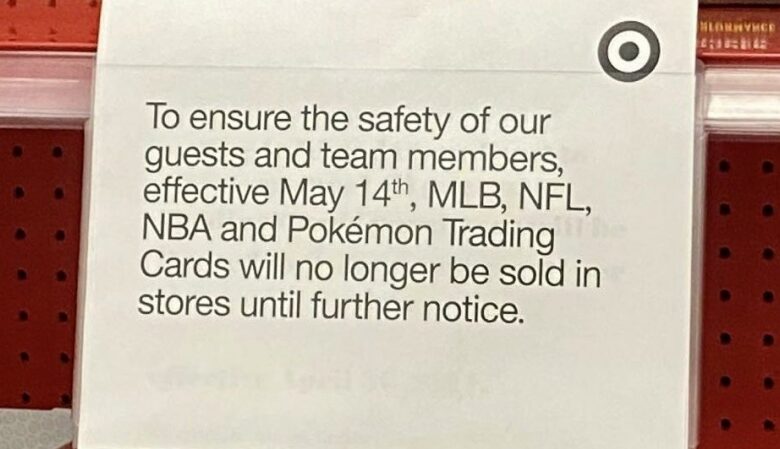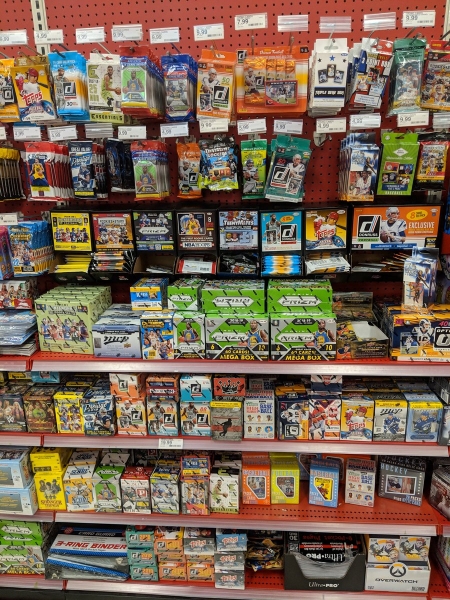Editor’s Blog: Why the Buzz Over Target’s Trading Card Halt is a Hobby Bonanza

At 5:45 PM last Thursday, I hopped on Twitter to post a link to a story I had just confirmed with Target’s corporate office in Minneapolis: the company would no longer be selling baseball, football, basketball or Pokemon cards in its stores.
Up until that point, it had been little more than social media chatter and scattered signs inside some stores but later that evening, the company itself posted the same statement to its social media accounts.
Of course, it was a pretty big deal in the hobby for a bunch of reasons but by Saturday, it somewhat remarkably became a big story in the mainstream media. The New York Times picked it up. USA Today. NBC News. Yahoo. CNN. CBS. CTV in Canada. Fox Business News. Forbes. The Athletic. The Washington Post did a story on the hobby’s sudden evolution. The Associated Press then sent it everywhere. TV stations localized it. Talk radio buzzed about it.
Target announced on Friday that it will temporarily stop selling Pokémon and sports trading cards in stores due to safety concernshttps://t.co/I5HlgTiQ7M
— KTLA (@KTLA) May 14, 2021
Eighteen months ago if someone had told me that much of North America’s media would one day be talking about blaster boxes at Target, I’d have thought they’d been sniffing glue. And yet here we are.
It wasn’t a shock. Things had been heading in that direction for months. Not many large businesses put up with stuff that makes them uncomfortable and when there’s running, shouting, arguing and people loitering the aisles–let alone a parking lot fight that ends with a gun pulled–there’s a lot of uncomfortable involved. Target sells a ton of cards, but it’s not vital to their success. Collectors who remember the good old days of 2019 when you could stroll in and buy pretty much whatever you wanted let out a chorus of “I’m not surprised.”

The news disappointed the notorious flippers who turned those $20 and $30 blaster boxes and $5 and $10 packs into $75 boxes and $25 packs. Panini and Topps were undoubtedly disappointed that some overly aggressive profiteers had ruined an important entry point for new collectors and youngsters. Regular Joes who just liked being able to turn a toilet paper run into a toilet paper and basketball card run were disappointed, but hopeful that maybe the whole thing would mean the flippers would leave and things would return to (sort of) normal.
Target will continue to sell cards online and despite the experiences of many collectors, a spokesman told me they actually are trying not to let shopping bots gobble them all up.
“We’re focused on making it easy for guests to find and get the items they’re looking for,” he stated. “We constantly track and block bot attempts, and have a number of security and operational measures in place to prevent and protect against bots.”
Whether they need to step up their game is a story for another day, but from my observations over the last few days, the whole “TARGET STOPS SELLING SPORTS CARDS!’ thing has had an impact that’s far more important. In a time when the hobby has gotten more widespread publicity than ever before, this one takes the cake. It’s snaring more attention than any hobby-related story I can recall. And in a time of multi-million dollar LeBrons and Mickeys and Last Dances and celebrity collectors, that’s saying something.
The difference is that this story isn’t just about sports cards. It’s about shopping. It’s about greed. It’s about crime. It’s about the economy. Sports and side hustles. Pandemics and popularity. Those things are why the story was of interest to so many editors and producers and struck a nerve with the public.
Part of that public had cards still tucked away in a closet and the story about Target essentially banning cards because they were too popular has spurred them into action. I’ve had multiple people reach out to me in the last few days by email or social media with questions about value, about how to have their cards graded, about where to buy cards and a few other topics. I’m sure local hobby shops, auction houses and online outlets are benefitting from the curiosity of people who have been hearing about the “trading card revival” as it’s often called in news stories. Some who need cash want to know how they can get a piece of the action.
(Just an aside here…The next time someone bashes “the lamestream media” over a perceived bias of one kind or another or laments the lack of coverage on a favorite issue–mostly thanks to staff cuts because so many knuckleheads think they can “get the news for free on Facebook”– remember how much money all of their stories on sports cards have put in your pocket over the last 12-14 months. Stick a chro-bar in your wallet and buy a damn subscription to your local paper.)
Just in the last few days, millions more people have learned about what’s been happening in our little world. It’s the extension of a gravy train of publicity that most hobbies or attention seeking individuals would die for. And there are always more people out there who 1) don’t know what’s going on or 2) want to know more. I can’t tell you how many people are still just waking up to the fact that sports cards didn’t die in 1994.
Even if, as skeptics insist, there’s a “bubble” element to all of it, we’re never going back to 1995. It’s a far more sophisticated mama these days.
Yes, in some ways it would be nice to turn back the clock and make $19.99 boxes of cards part of collectors’ God-given constitutional rights again. Maybe somehow, some way, those days will return when Target, the card companies and the distributors can come up with a solution. In the meantime, the sports card business has just gotten another massive shot in the arm, which is an all too appropriate phrase for 2021.
What a time.





